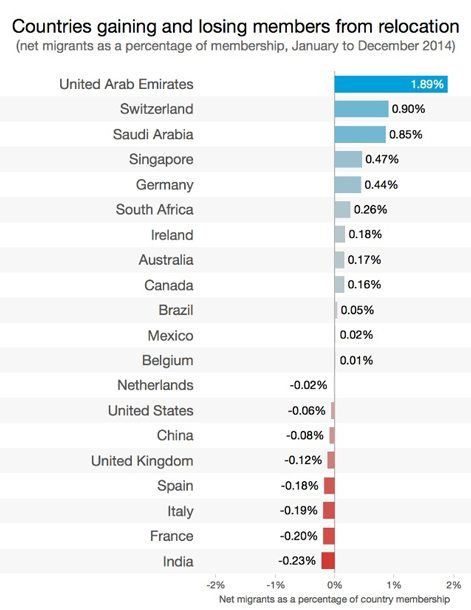Analyzing its membership (which is now more than 380 million), LinkedIn has provided some insight on where global talent has been moving.
LinkedIn focused its study on the period between January and December 2014. They looked at members profiles which were updated with a new job and location during this time.
The United Arab Emirates topped the talent migration tanking for the second year in a row, and had a 1.89% boost in their workforce. This is double the closest competitor, Switzerland, which had a 0.9% increase.
Trailing the two nations in third place is Saudi Arabia, which just barely lost to Switzerland, with an increase of 0.85%.
Singapore was ranked 4th and these are the top industries/occupations here:
- Top industries - Technology, Financial Services & Insurance, and Professional Services
- Top occupations - Salespeople, construction/civil engineers , manufacturing/mechanical engineers, project managers, quality assurance/system testers, construction/maintenance tradespeople

Speaking on the issue, Sohan Murthy, head of Research, Data Analytics and Strategy at LinkedIn, stated “The UAE is very interesting because the country’s doing a lot to diversify job opportunities in that region and it’s beginning to show in the data.”
Continuing with the topic, head of LinkedIn MENA (Middle East North Africa) said the findings of the study “fall in line with the most prominent areas of growth in the UAE – Smart initiatives are on the rise, the financial sector is booming, and construction is experiencing a high with the preparations for Expo 2020 and a strong economy.”
Studying the data more closely, analysts were able to determine that UAE and India (which was the lowest in the migration ranking) were linked in many aspects that concerned volume and direction of talent.
Murthy speaks on the matter, stating, “The top country in which members immigrated from to the UAE was India. Many of them were working in tech firms as well as professional services firms like IT consulting and management consulting.” Murthy continues to say that “Tech as a sector is growing globally and provides for a lot of jobs that pay well and allow members to relocate internationally.”
Murthy made a point to discuss the importance that each of the countries unique qualities has on the data. As an example, Saudi Arabia’s oil and energy sector’s ability to create a demand for consultants and project managers was brought up.
You can read more about the results and specifics of which jobs are growing in different countries, here and here.
